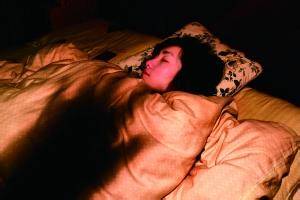(单词翻译:单击)
It may be easier to blame sleep paralysis on evil spirits because what's actually happening in your brain is much harder to explain.
也许把睡眠瘫痪这种现象归结于是因可怕的恶魔们而起更简单,因为真正在人们脑海中发生的事情实在是太难解释了。
Modern scientists believe that sleep paralysis is caused by an abnormal overlap of the REM, rapid eye movement, and waking stages of sleep.
当代的科学家认为睡眠瘫痪是由于睡眠的 REM 阶段(快速动眼期)跟清醒阶段的非正常交错而引起的。
During a normal REM cycle, you're experiencing a number of sensory stimuli in the form of a dream, and your brain is unconscious and fully asleep.
在一个正常的快速动眼期中,会经历许多感官刺激,这些刺激以梦的形式加以表现,但是大脑是完全处于睡眠状态并且没有意识。
During your dream, special neurotransmitters are released, which paralyze almost all of your muscles.
在你的梦中,特殊的神经递质被释放,它们几乎麻痹了你所有的肌肉。
That's called REM atonia.
这就叫做快速眼动期的肌肉迟缓。
It's what keeps you from running in your bed when you're being chased in your dreams.
这也是为什么当你梦见在被追赶却不会真的从床上爬起来跑动的原因。

During an episode of sleep paralysis, you're experiencing normal components of REM.
在睡眠瘫痪这种情形中,你会经历快速动眼期的所有正常部分。
Your dreaming and your muscles are paralyzed, only your brain is conscious and wide awake.
你会做梦并且你的肌肉被麻痹,只有你的大脑非常清醒并且有意识。
This is what causes you to imagine that you're having an encounter with a menacing presence.
这就是让你产生遇到具有恐怖长相的人的幻觉的原因。
So this explains the hallucinations, but what about the feelings of panic, strangling, choking, chest pressure that so many people describe?
所以,这解释了幻觉部分,但是恐慌部分怎么说呢?扼死感,窒息感,胸部的压迫感这些被很多人描述的感觉?
Well during REM, the function that keeps you from acting out your dreams,
事实是,在快速动眼期,使你睡觉时不会真正做出梦中行为的这种身体机能
REM atonia, also removes voluntary control of your breathing.
-快速动眼期的肌肉迟缓,也剥夺了你呼吸的自主控制权。
Your breath becomes more shallow and rapid.
你的呼吸变得更浅、更快。
You take in more carbon dioxide and experience a small blockage of your airway.
你呼入更多的二氧化碳并且经历呼吸通道的微微堵塞。
During a sleep paralysis episode, a combination of your body's fear response to a perceived attack by an evil creature and your brain being wide awake
在睡眠瘫痪这种情形中,你整个身体的恐惧反应聚集成为一种被邪恶生物攻击的感觉,你的脑子十分清醒,
while your body is in an REM sleep state triggers a response for you to take in more oxygen.
当你处于快速动眼期的时候会触发身体机制以呼入更多的氧气。
That makes you gasp for air, but you can't because REM atonia has removed control of your breath.
这就使你想要喘息以呼入空气,但是你不能,因为快速动眼期的肌肉麻痹已经剥夺了你控制呼吸的权利。
This struggle for air while your body sleeps creates a perceived sensation of pressure on the chest or suffocation.
这种当你睡着时身体为呼吸空气的挣扎产生了一种可以被感知的感觉,这就是胸部压迫感或者说是胸闷的感觉。
While a few people experience sleep paralysis regularly and it may be linked to sleep disorders such as narcolepsy,
然而一小部分人会经常经历睡眠瘫痪,这也许与一些睡眠紊乱症有关比如嗜睡症,
many who experience an episode of sleep paralysis do so infrequently, perhaps only once in a lifetime.
那些经历睡眠瘫痪的人很偶然也会产生嗜睡,也许一生中就一次。
So you can rest easy, knowing that an evil entity is not trying to haunt, possess, strangle, or suffocate you.
所以不用担心,因为你已经知道那些可怕的东西并不是在尝试缠上你,占有你,扼死你,或者使你窒息。
Save that for the horror films!
还是把这些想法都留给恐怖电影吧!


